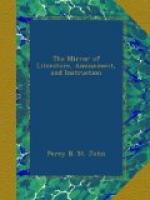The correctness of these statements will appear from a reference to the 4th and 5th chapters of Sir W. Betham’s recently published work on “Dignities Feudal and Parliamentary,” or to Sir James Mackintosh’s History of England.
M.
* * * * *
We admit that the battle of Evesham, literally speaking, was not the origin of the House of Commons, and wish our correspondent P.T.W. had furnished us with the name of the “modern writer” who has made the assertion. At the same time it must be conceded that the fall of Simon de Montfort, at Evesham, led to the more speedy consummation of the wished for object. Thus Sir James Mackintosh, History of England, vol. i. p. 236, says—
“Simon de Montfort, at the very moment of his fall, set the example of an extensive reformation in the frame of parliament, which, though his authority was not acknowledged by the punctilious adherents to the letter and forms of law, was afterwards legally adopted by Edward, and rendered the parliament of that year the model of the British parliament, and in a considerable degree affected the constitution of all other representative assemblies. It may indeed be considered as the practical discovery of popular representation. The particulars of the war are faintly discerned at the distance of six or seven centuries. The reformation of parliament, which first afforded proof from experience that liberty, order, greatness, power, and wealth, are capable of being blended together in a degree of harmony which the wisest men had not before believed to be possible, will be held in everlasting remembrance. He died unconscious of the imperishable name which he acquired by an act which he probably considered as of very small importance—the summoning a parliament, of which the lower house was composed, as it has ever since been formed, of knights of the shires, and members for cities and boroughs. He thus unknowingly determined that England was to be a free country; and he was the blind instrument of disclosing to the world that great institution of representation which was to introduce into popular governments a regularity and order far more perfect than had heretofore been purchased by submission to absolute power, and to draw forth liberty from confinement in single cities to a fitness for being spread over territories which, experience does not forbid us to hope, may be as vast as have ever been grasped by the iron gripe of a despotic conqueror. The origin of so happy an innovation is one of the most interesting objects of inquiry which occurs in human affairs; but we have scarcely any positive information on the subject; for our ancient historians, though they are not wanting in diligently recording the number and the acts of national assemblies, describe their composition in a manner too general to be instructive, and take little note of novelty or peculiarity in the constitution of that which was called by the Earl of Leicester.




